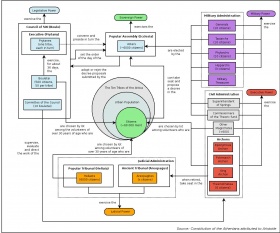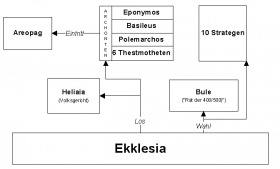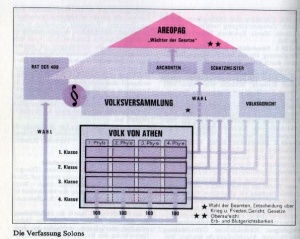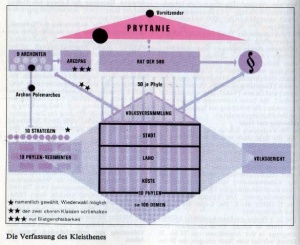Sokrates (PR Hrachovec, 2007/08): Unterschied zwischen den Versionen
Aus Philo Wiki
K (→Allgemeine Unterlagen: alice-link) |
Anna (Diskussion | Beiträge) K (→Die Athenische Verfassung: Gerichtssystem) |
||
| Zeile 23: | Zeile 23: | ||
<center>[[Bild:verfassung-kleisthenes.jpeg|thumb|none]]</center> | <center>[[Bild:verfassung-kleisthenes.jpeg|thumb|none]]</center> | ||
| + | |||
| + | |||
| + | ==== Gerichtssystem ==== | ||
| + | |||
| + | : The cases were put by the litigants themselves in the form of an exchange of single speeches timed by water clock, first prosecutor then defendant. In a public suit the litigants each had three hours to speak, much less in private suits (though here it was in proportion to the amount of money at stake). Decisions were made by voting without any time set aside for deliberation. Nothing, however, stopped jurors from talking informally amongst themselves during the voting procedure and juries could be rowdy shouting out their disapproval or disbelief of things said by the litigants. This may have had some role in building a consensus. The jury could only cast a 'yes' or 'no' vote as to the guilt and sentence of the defendant. For private suits only the victims or their families could prosecute, while for public suits anyone (ho boulomenos, 'whoever wants to' i.e. any citizen with full citizen rights) could bring a case since the issues in these major suits were regarded as affecting the community as a whole. (Wikipedia) | ||
Version vom 3. Oktober 2007, 08:08 Uhr
Inhaltsverzeichnis
im Aufbau
Allgemeine Unterlagen
Introduction to Object Oriented Programming through Interactive Fiction
Tutorial: Interactive Fiction am Beispiel von Alice im Wunderland
Die Athenische Verfassung
Gerichtssystem
- The cases were put by the litigants themselves in the form of an exchange of single speeches timed by water clock, first prosecutor then defendant. In a public suit the litigants each had three hours to speak, much less in private suits (though here it was in proportion to the amount of money at stake). Decisions were made by voting without any time set aside for deliberation. Nothing, however, stopped jurors from talking informally amongst themselves during the voting procedure and juries could be rowdy shouting out their disapproval or disbelief of things said by the litigants. This may have had some role in building a consensus. The jury could only cast a 'yes' or 'no' vote as to the guilt and sentence of the defendant. For private suits only the victims or their families could prosecute, while for public suits anyone (ho boulomenos, 'whoever wants to' i.e. any citizen with full citizen rights) could bring a case since the issues in these major suits were regarded as affecting the community as a whole. (Wikipedia)



